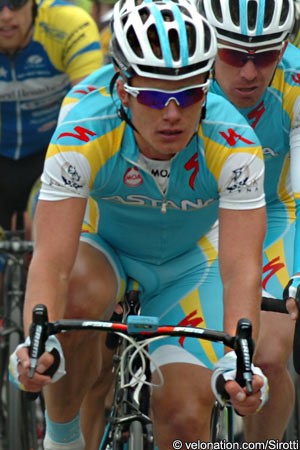“I think it is an important thing to do… to send an important signal,” says Giuseppe Martinelli
 Astana could be set to apply for membership of the Movement for Credible Cycling (MPCC), the team’s general manager, Giuseppe Martinelli has told the Swedish branch of Eurosport. The Kazakh team has something of a chequered past, with several doping positives since its inception in 2007 – and recently retired rider, turned manager Alexandre Vinokourov is currently subject to a International Cycling Union (UCI) investigation into the alleged fixing of the 2010 edition of Liège-Bastogne-Liège – but Martinelli sees membership of the staunchly anti-doping club of teams as important for Astana to move forward.
Astana could be set to apply for membership of the Movement for Credible Cycling (MPCC), the team’s general manager, Giuseppe Martinelli has told the Swedish branch of Eurosport. The Kazakh team has something of a chequered past, with several doping positives since its inception in 2007 – and recently retired rider, turned manager Alexandre Vinokourov is currently subject to a International Cycling Union (UCI) investigation into the alleged fixing of the 2010 edition of Liège-Bastogne-Liège – but Martinelli sees membership of the staunchly anti-doping club of teams as important for Astana to move forward.
“I think it is an important thing to do, to try to change something or in any case to send an important signal,” he said.
“Maybe we don’t talk about it so much, but we really do a lot [of anti-doping work],” the Italian explained. “We have an internal system that monitors all cyclists day by day. We perform our internal controls.”
The team was originally formed at the end of 2006 out of the ashes of the Liberty Seguros-Würth team, which collapsed as its manager, Manolo Saiz, was heavily implicated in Operación Puerto. Almost immediately, the team was rocked by scandal however, as Vinokourov tested positive for blood-doping at the 2007 Tour de France, and then Andrey Kashechkin did so shortly afterwards.
A new management team was then brought in headed by Johan Bruyneel, who had presided over the now-disgraced Tour de France reign of Lance Armstrong; despite the change in personnel however, the team was not invited to the 2008 Tour. Armstrong chose the team for his comeback in 2009 – which has since been erased from the record books by the United States Anti-Doping Agency (USADA) – but he moved on at the end of the year, taking Bruyneel and a number of riders with him.
Vinokourov returned to his team in 2010 but, once again, the team’s season was marred by the Clenbuterol positive of Alberto Contador on his way to victory in the Tour.
“We are a team that has changed a lot since two years ago,” explained Martinelli, who joined the team in 2011. “We are seeing the results of that now.
“Until now, for that specific reason we have not had any more problems. But it’s too early to talk – as I said, we need to work more and talk less.”
Vinokourov has, in the past, been linked to controversial doctor Michele Ferrari – who has since been banned for life as part of the USADA Armstrong case – but Martinelli insists that things have changed.
“All this is history,” he stated. “During these last few years I think everybody knows [Ferrari] is out of cycling,” he added. “If some stupid person after that goes to Ferrari I think they really should not be racing anymore.
“Since I arrived, from 2010, I have never seen the Ferraris – I have not seen them with our team. I think the idiots – we have a lot of them in our sport – have understood the story now and they are very careful.”
Under the MPCC regulations, Astana would agree to be bound by the folllowing rules.
– No longer allow a rider race when he has an initial positive test.
– Do not sign up a rider who has a suspension of more than six months [with the exception of whereabouts cases] for two years after the suspension.
– Don’t give corticoid injections without imposing a break from competition of eight days.
– Carry out internal procedures from the first positive case on a team.
– The team should suspend itself automatically following several positive cases in a twelve month period.
Essentially, MPCC teams are subject to much more stringent anti-doping requirements than non-member squads; the second of these rules [which was one of the rules for the original UCI ProTour teams – ed] would have meant that Vinokourov would not have been able to rejoin Astana in 2009 after his suspension for blood-doping.
As for the alleged race-fixing; while the MPCC regulations deal only with doping violations, the buying of races from ones rivals does not exactly lend the sport any ‘credibility’. This is not something that Martinelli feels will obstruct the team as it moves forward, however.
“He will explain everything that he has done and what he hasn’t done,” said Martinelli. “He is an intelligent and serious guy, so he will know how to take responsibility.
“He was calm when I saw him five, six days ago in our training camp. If he is calm I think we can be as well.”